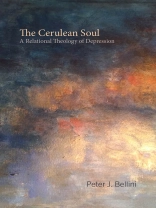Depression is difficult to define. It is commonly described as a chemical imbalance, a subjective experience of despondency, or even a semiotic construct. The various theories of depression–biochemical, psychological, cultural–often reflect one’s philosophical anthropology. How one defines the human person is telling in how one defines mental disorder. Philosophy and the sciences tend to offer reductive explanations of what it means to be human, and such approaches rarely consider that we may be spiritual beings and so fail to entertain a theological approach.
Peter J. Bellini invites us to reimagine the person in light of the image of God in Christ, the divine enfleshed in human weakness. The Cerulean Soul responds to real challenges in the sciences and philosophy and offers a relational theological anthropology shaped by a cruciform framework that assumes and affirms human contingency, limitation, and fallenness. With reference to Christ’s incarnation, Bellini reveals how depression is inexorably tied to our relationship with God as his created beings: original, fallen, and renewed. Despondency serves as a biosocial and spiritual marker for our human weakness, brokenness, and spiritual struggle for meaning and wholeness. Further, it is a call to grow, to be restored, and to be made holy in the image of God in Christ. What emerges is a therapeia of the imago for depression that fills the gaps in our present attempts to determine the malady’s etiology and treatment.
Taking the missio Dei of union with the risen Christ as its goal, The Cerulean Soul opens up the perennial problem of human despondency to an eschatological trajectory of hope and peace, redemption and transformation, given freely in Christ through the healing and sanctifying work of the Holy Spirit. Christoformity, informed by the subversive kingdom of God, gives new form to all persons, ‘abled’ and ‘disabled.’
Tabella dei contenuti
I Introduction to Melancholia
1 Introduction
2 Ontology of Melancholia: Definitions, Ontologies, and Anthropological Problems
II Theological Anthropology
3 Models of Theological Anthropology and Depression
4 The Relational Image of God
III Etiology of Mental Disorder: The Theological Types
5 Theological Type 1–The Natural
6 Theological Type 2–The Consequential
7 Theological Type 3–The Purgative
IV A Trinitarian Theology of Melancholia
8 The Melancholic God: Does God Get Depressed?
9 Toward a Trinitarian Theology of Depression
Circa l’autore
Peter J. Bellini is Associate Professor of Evangelization in the Heisel Chair and Director of Non-Degree Programs at United Theological Seminary.







![Copertina di Brian Schrag & Julisa Rowe: Community Arts for God's Purposes [Chinese] 貼近神心意的社群藝術 Copertina di Brian Schrag & Julisa Rowe: Community Arts for God's Purposes [Chinese] 貼近神心意的社群藝術](https://static.worldofdigitals.com/thumb_webp/740/9781645083740.webp)




